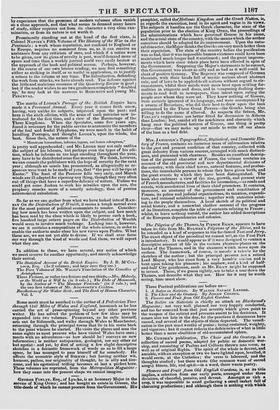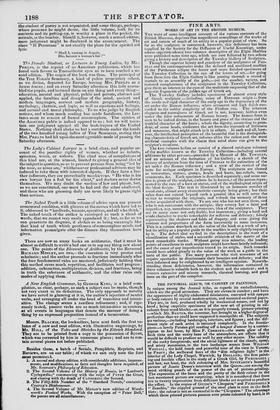Three Poetical publications are before us-
1. A Satire on Satirists. By WALTER SAVAGE LANDOR. 2. The Choir and the Oratory. By JOSIAH CONDER.
3. Flowers and Fruit from Old English Gardens.
The Satire on Satirists is chiefly an attack on Blackwood's Magazine; not very well planned nor very happily conducted,. and too far removed from that just severity which gives point to the weapon of the satirist and procures assent to his decisions. It comes also too late in the day, for the practices it denounces have ceased, and several of the objects of them departed. The versifi- cation is the part most worthy of praise ; being sustained, weighty, and vigorous ; but it cannot redeem the deficiencies of what is little better than a mere ebullition of old-accumulated spleen.
Mr. CONDER'S publication, The Choir and the Oratory, is a collection of sacred poems, adapted for public or domestic wor- ship, and consisting of Psalms and Collects thrown into verse, as well as of original flights. The spirit of the whole is devout,and amiable, with an exception or two we have lighted upon, levelled, it would seem, at the Catholics ; the verse is laboured, and the thoughts studied ; but there wants (the common want of sacred songs) fitness, life, and spirit—in a word, there wants poetry.
Flowers and Fruit from Old English Gardens, is, as its title implies, a selection from our early poets, arranged under three divisions, of cheerful, pensive, and devout. Amongst so rich a crop, it was impossible to avoid gathering a small casket full of charming productions ; and although there is nothing with which the student of poetry is not acquainted, and some things, perhaps, whose presence he might desire, the little volume, both for its contents and its getting-up, is worthy a place in the pocket, the reticule, or the boudoir. Should it, however, reach a second edition, more judgment might be displayed in the arrangement. The class "It Penseroso" is not exactly the place for the spirited old lyric
" Shall I, wasting in despair, Die, because a woman's fair ?"



























 Previous page
Previous page